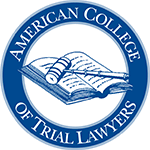Peters and Rubin present first successful “Sexsomnia” defense in Child Molestation case in Georgia – Jury takes less than 2 hours to acquit Defendant
Lake Oconee News
Jury takes less than two hours to acquit Defendant
September 4, 2009
After five days of testimony that included descriptions of “sexsomnia,” “parasomnia” and “confusional arousal,” it took a jury less than two hours Monday to acquit the defendant of child molestation charges.
“This jury by its verdict spoke as the conscience of this community,” said defense attorney Doug Peters. “They said loudly and clearly what the truth is.
“The defendant was charged with aggravated child molestation and child molestation for alleged acts against a seven-year-old girl as she slept at his home on the night of Oct. 27, 2007. His defense, conducted by Peters and Robert Rubin of the law firm Peters, Rubin, & Reynolds in Decatur, was built around the contention that the defendant was asleep when the incident occurred and that he had no knowledge of what he was doing.
“This is a case about a good man who did a bad act, but he didn’t commit a crime,” Peters told the jury in both his opening and closing statements.
The prosecution, led by the Assistant District Attorney, argued throughout the trial that the defendant was awake and aware of what he was doing, and that he used the excuse of being asleep to cover a crime.
After the not guilty verdicts were read, more than a hundred spectators, many of them friends and acquaintances of the defendant and his family, broke into applause. Some began crying tears of joy and relief, and stood in line in the courtroom to hug the defendant and congratulate his attorneys.
“It’s amazing,” said Rubin as he looked over the courtroom scene. “To my knowledge, this is the first acquittal verdict in a parasomnia case in Georgia.
The District Attorney, who played support role in prosecuting the case, had little to say following the verdicts.
“The jury has spoken and we accept it.” he said.
The defendant, tears in his eyes, thanked his defense attorneys and his friends and family for their support.
“I don’t know what to say, I’m so thankful,” he said. “It’s been a long, hard road.”
Had he been convicted of the charges, the defendant would have faced a prison term of 25 years to life on the aggravated child molestation charge and five to 20 years on the child molestation charge.
Two psychiatrists who specialize in treating sexual disorders provided key testimony on the defendant’s behalf. Both described in length a group of sleep disorders classifed as parasomnias which are abnormal sleep behaviors such as sleepwalking, talking while sleeping, arm and leg movements, and in rare instances, acting out sexually by fondling a bed partner, masturbating, talking about sex or engaging in intercourse.
“People with parasomnia typically don’t remember what they did,” said Dr. Paul Federoff, an associate professor of psychiatry at the School of Medicine at the University of Ottawa, and the director of the Sexual Behaviors Clinic of the Royal Ottawa Mental Health Care Group.
Federoff, who flew in from Canada to testify at the trial, is recognized as one of the pioneer researchers in the relatively new field of parasomnia and is credited with coining the phrase “sexsomnia,” according to his testimony.
He said parasomnia, while more common in children, is rare in adults. He estimated that about 4 percent of adults suffer from the disorder, and said the percentage who have sexsomnia, a subcategory of parasomnia, is unknown.
He described parasomnia as a disruption in the normal sleep “architecture” caused by a variety of factors including stress, alcohol, sleep apnea and antihistamines.
Federoff, who conducted a psychiatric interview and a sleep study of the defendant in 2008 when the defendant traveled to Ottawa, told the jury the defendant meets the criteria for parasomnia.
“It’s very significant that he has a history of parasomnia episodes,” Federoff said, referring to reports and testimony from the defendant’s family members and friends that in the past the defendant had walked and talked in his sleep, urinated in a closet in his sleep, fondled male friends while they were sleeping during a ski trip, and behaved sexually with his wife while asleep.
Testimony also showed that the defendant drank alcohol and took an antihistamine tablet on the night of the alleged molestation.
“The defendant is as good an example of someone who has this problem (sexsomnia) as I am aware of,” Federoff said.
Agreeing with that diagnosis was Dr. Gene G. Abel of the Behavioral Medicine Institute of Atlanta.
“I believe this is a case of parasomnia,” he told the jury. “The critical thing is that the defendant was asleep. People who are faking don’t wake up in the middle of the night acting out. Their behavior is always on the front end of going to sleep.
“Abel also told the jury that people suffering from parasomnia are not conscious of their behavior until they are awakened.
“The behavior is called to their attention by their bed partners,” he said. “They have no memory of the inappropriate behavior.
“Like Federoff, Abel said that the defendant’s history of sleep disorders played a significant role in his diagnosis of parasomnia.
“These things don’t just popup.” he said.
The defendant, who took the stand on the second day of the trial, told the jury he had no recollection of the alleged incidents with which he was charged.
“I can’t imagine doing something like this,” he said.
He said that when he awoke, he found his head on the child’s chest.
“I was confused and startled,” he said. “I had been dead asleep and had no idea what I was doing.
“A witness for the prosecution, Delores Roys, PhD, a clinical psychologist at the Highland Institute in Macon who specializes in treating sexual disorders, testified earlier in the trial that attempting to make a child believe a sexual assault was an accident is a common behavior of child molesters.
“It’s not unusual at all for a man to pretend he was asleep.” she told jurors.
That assessment was later attacked by Peters, who pointed out that Roys never interviewed the defendant and knew none of the particulars of the case.
Another prosecution witness, Russell Rosenberg PhD, founder and director of the Atlanta School of Sleep Medicine and Technology, testified that it was his opinion that the defendant did not experience sexsomnia or confusional arousal on the night of the alleged molestation. Confusional arousal, he said, is a sub-category of parasomnia behavior that is described in the International Classification of Sleep Disorders, a diagnostic manual for sleep and sleep medicine research.
He testified that the defendant’s behavior earlier in his life — sleepwalking, sexually acting out while sleeping with friends on a ski trip or sexual behavior with his wife while sleeping — were consistent with parasomnia. But the behavior described in the alleged molestation could not be ascribed to the disorder, he said.
“There is usually no sense of right or wrong in these cases, so someone who suffers from parasomnia wouldn’t immediately claim it was an accident,” he said. Rosenberg also said people experiencing a parasomnia episode are usually hard to awaken, and that the person would remain in a somewhat confused state and not be aware of the situation they are in.
“They usually can’t think clearly enough to immediately explain the behavior,” he said.
“It’s my opinion that his event was not parasomnia.”
Peters countered that Rosenberg had not interviewed the defendant, had never treated a case of sexsomnia, had not published any articles about parasomnia and was not familiar with the work of some of the leading experts in the field, including Dr. Abel.
A key contention emphasized at every stage of the trial by the defense team was that he had to be awakened by the child.
“There were two witnesses in the room — the child and the defendant. Both of them said he was asleep and that he did not know what he was doing.” Peters said. “The state (prosecution) while building its case hasn’t listened to what the child said. She has never changed her story.”
Another major defense strategy throughout the trial consisted of reminding the jury at every opportunity that the defendant himself reported the incident to the Department of Family and Children Services. When asked if she had knowledge of a person ever reporting himself, a DFACS employee [who testified in the case] replied she did not.
That was the single most selfless act in this case,” Rubin told the jurors in the closing arguments.
The defense also disputed the validity of a forensic interview with the child conducted at the Crescent House, an advocacy center for children that is affiliated with the Medical Center of Central Georgia in Macon. The jury was shown a DVD of the interview, conducted by Ashley Wilson, who told jurors the child’s demeanor and body language during the interview exhibited a high level of anxiety and conflicted behavior.
During cross-examination, Peters pointed out that the child said the defendant was asleep, and that the interviewer did not follow up on that line of questioning.
A defense witness, Nancy C. Aldridge PhD, a psychotherapist and child specialist, later testified that the forensic interview at the Crescent House was laced with incorrect procedures, including interviewer bias (questioning that leads to preestablished conclusions), failure to consider alternate hypotheses (other possible explanations for the behavior), coercive questioning (repeating questions if the child does not give the answer the interviewer wants and failure to document the interview correctly with camera locations and clear visuals of graphics and charts.
Following the acquittal verdicts, the defendant’s father-in-law said the family always had faith that the outcome would be a favorable one.
“We supported him from the start,” he said. “We know his character and we know he’s a good man.”








